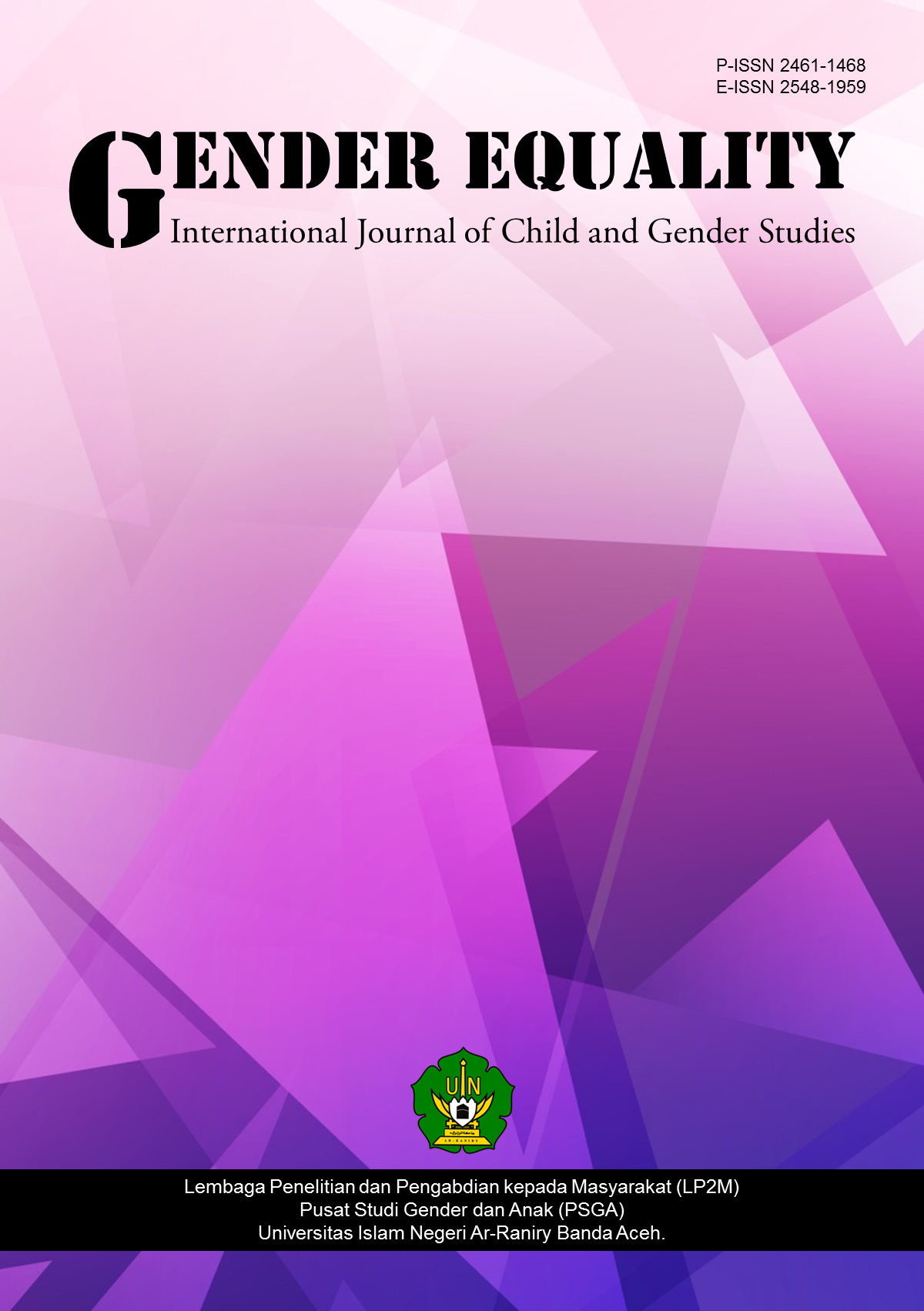PELAKSANAAN TOILET TRAINING DALAM PRESPEKTIF ISLAM DI RA AL FURQON 2 KEDUNGWARU TULUNGAGUNG
DOI:
https://doi.org/10.22373/equality.v6i1.6543Keywords:
Toilet Training, Early Childhood, Islamic PerspectiveAbstract
Toilet training is a way to train children in controlling their bodies when going to defecate (BAB) and urinate (BAK), carried out when the childrenare ready both physically, mentally and intellectually. In kindergarten aged, they should be able to control the urinary tract so that children no longer wet or bulge. The purpose of this study was to determine the implementation of toilet training in the perspective of Islam in RA Al Furqon 2 Kedungwaru Tulungagung. The method used is descriptive qualitative method, where researchers as key instruments. The results of this study: 1) the teacher explains cleanliness, purity and impurity, and manners when defecating, urinating and how to use the toilet and clean it. 2) Taught prayer reading into the toilet and exiting the toilet, 3) gives students the opportunity to defecate (BAB) or small (BAK). ) When they find a sign of students want to urinate (BAK) and defecate (BAB) and escort him to the toilet. 5) students are taught to queue, alternately, and orderly in using the toilet, 6) teach to flush the toilet and get students to wash their hands properly after defecating (BAB) and urinating (BAK) 7) getting students used to take off and use own clothing after large and small waste 8) give praise and appreciation. Toilet Training at RA Al Furqon 2 has been successful because there were no students who wet their bed.
References
Al Gazy, As-Syekh Muhammad bin Qosim, (1991) Fatkhul Qorib jilid 1, Trjm. Surabaya: Al Hidayah
Alimul Hidayat A Aziz, (2015), Pengantar Ilmu Keperawatan edisi 1 Jakarta: Salemba Medika
Alimul Hidayat A Aziz, 2012),Pengantar Ilmu Kesehatan Anak untuk ilmu kebidanan, Jakarta: Salemba Medika
Ensiklopedia Islam jilid 2,(1997/1998), Departemen Agama RI, Direktorat Jendral Pembinaan Kelembagaan Agama Islam Proyek Peningkatan Prasarana dan Sarana Perguruan Tinggi Agama/IAIN Jakarta
Hasibuan, Susi Natalia (2006) Pengaruh Toilet training Terhadap Kejadian ISk berulang pada anak Usia 1-5 Tahun, Tesis Universitas Diponegoro Semarang,
Huda, Miftakhul, (2015, Agustus), Sasanti Juniar, Hubungan Pola Asuh dengan Enuresis pada Anak, Jurnal Psikiatri Surabaya, Vol 4 No. 2.
Hurlock Elizabet, (1978)Child Development/ Perkembangan Anak, Terj, Jilid 1, Jakarta, Erlangga
Kurniawati, F (2018), Enuresis. Buletin Penelitian RSU Dr. Soetomo, Surabaya, 89-95
Moleong Lexy, (2017),Metodologi Penelitian Kualitatif, Rev, Bandung, Remaja Rosdakarya,
Mujadidatul Musfiroh, Beny Lukmanawati Wisudaningtyas,(2014, Juli), Penyuluhan Terhadap Sikap Ibu Dalam memberikan Toilet Training Pada Anak, KEMAS Jurnal Kesehatan Masyarakat, 2 Universitas Negeri Semarang
Ningsih, Sri Fitdiyah (2017)Hubungan Pengetahuan dan Perilaku Ibu Dalam Menerapkan Toilet training Dengan Kebiasaan Mengompol, Skripsi Program Studi Ilmu Keperawatan Fakultas Kedokteran dan ILmu Kesehatan UIN Syarif Hidayatullah, Jakarta,
Rohmah, Liatul, (2019)Panduan Mudah Tilet Training Bagi Balita Anda, Tulungagung: Akdemia Pustaka,
Syaikh Abdullah Al Fauzan, (2012)Minhatul Allam fii Syarh Bulughil Marom (Dar Ibnil Jauzi, cet. 4, 1433 H/
Tabrani ZA. (2012). Future Life of Islamic Education in Indonesia. International Journal of Democracy, 18(2), 271–284.
Yusoff, M. Z. M., & Hamzah, A. (2015). Direction of Moral Education Teacher To Enrich Character Education. Jurnal Ilmiah Peuradeun, 3(1), 119-132.
Yusuf, Syamsu (2015). Psikologi Perkembangan Anak dan Remaja, Bandung : Remaja Roda Karya,
Zaenul Fitri, Agus(2015)Manajemen Kurikulum Pendidikan Islam, dari normative-filosofis ke praktis, Bandung:Alfa Beta,
Zainunddin Bin Abdul Aziz al-Malibari al-Fannani,(2006),Fat’ul Mu’in. Jilid 1, Terj. Bandung, Sinar Baru Algesindo:
Zaivera Ferdinan,(2018)Mengenali dan Memahami Tumbuh Kembang Anak, Yogyakarta: Kata Hati.
Downloads
Published
Issue
Section
License
GENDER EQUALITY: International Journal of Child and Gender Studies allows the author(s) to hold the copyright and to retain the publishing rights without restrictions. Authors who publish with this journal agree to the following terms:
- Authors retain copyright and grant the journal right of first publication with the work simultaneously licensed under a Creative Commons Attribution License that allows others to share the work with an acknowledgment of the work's authorship and initial publication in this journal.
- Authors are able to enter into separate, additional contractual arrangements for the non-exclusive distribution of the journal's published version of the work (e.g., post it to an institutional repository or publish it in a book), with an acknowledgment of its initial publication in this journal.
- Authors are permitted and encouraged to post their work online (e.g., in institutional repositories or on their website) prior to and during the submission process, as it can lead to productive exchanges, as well as earlier and greater citation of published work.



